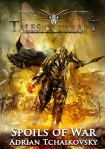Spoils of War (Tales of the Apt Book 1) by Adrian Tchaikovsky (best books to read txt) 📗

- Author: Adrian Tchaikovsky
Book online «Spoils of War (Tales of the Apt Book 1) by Adrian Tchaikovsky (best books to read txt) 📗». Author Adrian Tchaikovsky
The quality of my troops was also less than inspiring. About a third were light airborne: keen, skilled, swift and just the sort of soldier needed to crack this particular nut. The balance, though, were auxillians from Sonn. The Beetles of Sonn had done well out of the Empire and won, or stolen, a great many concessions, but they were still obliged to put up troops for the army, same as everyone else. As it wouldn’t do for the sons of Consortium magnates and factors to live in terror of conscription, the city elders’ practice was to send the army their criminals, which meant a scattering of thieves and a great many debtors. So it was that the men lined up to defend against the ravages of the Sel’yon were tradesmen, factory workers, artisans, clerks and small-time merchants, and military training sat uneasily on them. They were equipped with chainmail hauberks, shields and maces, which would have given them some clout in a field battle, if their nerve held, but for a contested advance through tangled woodland they were just about the worst-suited men one could have asked for.
When I got back to the camp I sent for Sergeant Wanton, whose greatest contribution to the war effort was to never once find anything amusing in his own name. “Old Mercy says we should be expecting some pioneers,” I told him.
“Yes, sir. They’ve arrived.”
“How many?”
“Ten, sir.”
I had hoped for a few more, but given Old Mercy’s habitual generosity I’d not have been too surprised at the pioneers turning out to be two scruffy Fly-kinden. Ten was better than nothing, if they were any good.
Pioneers were an odd lot, and their position in army hierarchy was vague. Officially they were right at the bottom, beneath regular soldiers, on a par with unskilled auxillians like my Beetle-kinden, just above slaves. Unofficially, those that lasted for any time at all tended to be good enough at what they did that the army handled them carefully. They were not quite soldiers, not quite mercenaries, not slaves but not entirely free. Their work required them to be out of reach of orders and officers most of the time, so they had more liberty than almost anyone in the army. At the same time, they were always suspect, and if they slipped up then the Rekef would take them, with glee.
I had them lined up for inspection. They were a motley band. Half were Wasps – four tough-looking men, out of uniform, wearing armour of leather and dulled chitin under capes or long coats, not a piece of black and gold to be seen. There was also one woman, apparently the partner of one of the men. I groaned at that – setting one woman down in a camp of army soldiers was always trouble. Even Beetle-kinden get the itch after a few years of campaigning, as plenty of Commonweal girls had found out. Of the balance, four were Fly-kinden, who tended to make the best pioneers – fast, sneaky, good shots and they could see well at night, at least as well as the Commonwealers they would be up again. Most Flies avoid physical danger as keenly as they do paying taxes, but I knew full well that when a Fly-kinden gets put through the mill enough you get a vicious little bastard at the end of the process.
The last of the pioneers stopped me dead, because Thorn Bug-kinden’ll do that to you, and this one was uglier than most. The top of his head came about to my shoulder, but his back peaked a few inches higher, and of course there were the thorns on top of that. He was bundled in layers of ragged tunic and coat, a tattered scarf snagged about his neck, and a cloak over that, and every garment was patched and darned and then torn through again. What little I could see of his skin was shiny and nut-brown, but the thorns grew out every which way, twisted and irregular. A lot of them were truncated, with the stumps sprouting a half-dozen smaller spikes like new shoots growing from a tree-stump, so that I wondered whether the creature had some uniquely Thorn Bug disease. The face was the worst. Even behind the stubble of small and large spines he was a nasty-looking member of the breed, long nose broken and reset crooked, with his pointed chin slanting the other way in a perverse kind of balance.
“And who in the pits are you?” I demanded, all military propriety slapped from me by the very sight.
“Auxillian soldier Cari, sir.”
The creature’s voice was low and husky, and undeniably a woman’s. Nothing else in that bundle of rags and thorns suggested the feminine, most certainly not the face.
“Cari,” I said weakly. “A Thorn Bug pioneer?”
“Try me, sir,” Her eyes, in amongst all of that hideousness, were green and lively.
I didn’t shrug, because imperial officers did not show that kind of casual weakness before their men. “It’ll be the Commonwealers trying you, not me,” was what I said, albeit a beat too late to be a proper riposte.
Our little slice of war started to change from that day. The pioneers knew their business.





Comments (0)